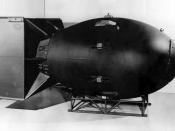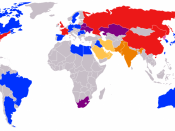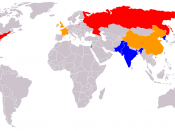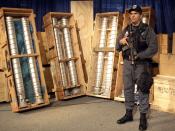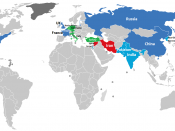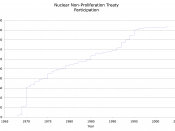[Type text]
Does the Non-State actor represent a new challenge to nuclear proliferation?
Non-state actor is a term widely used to mean any actor that is not a government (Willetts, 2005:426). Important non-state actors in international relations include: Non-governmental organizations (NGOs), Firms and businesses, especially multinational corporations (MNCs), International organized crime and drug groups and International paramilitary and terrorist groups. In this essay, it will discuss whether Non-State actor represents a new challenge to nuclear proliferation by observing with emphasis the relationships between the terrorist groups and Non-State actor. Although nuclear weapons has been strictly controlled by the states, such as Russia and USA, and the nuclear weapons are hard to be built, terrorists group still have capability and possibility to build or steal nuclear weapons. In the following, it will explain these possibilities.
The proliferation of nuclear weapons to terrorist groups is perhaps one of the most frightening threats to world security.
The attack of September 11, 2001 is a revival for politicians to face the threat of nuclear terrorism. The Nuclear Control Institute, since its commencement in 1981, has been analyzing the risks of nuclear terrorism and seeking to alert policymakers and the public to the danger. There was a solid basis for concern long before the attacks of September 11. In putting the terrorist attacks on 11 September into perspective, Jayantha Dhanapala, the United Nations Under-Secretary-General for Disarmament, has warned, "We need to be aware of the fact that this situation could have been much worse than it has been -- consider for example if weapons of mass destruction were used by these terrorists." (UN TV, September 19, 2001). A nuclear attack by a terrorist group would likely result in an extraordinary number of death. It could significantly foul an inner-city, causing economic and social disruption. This kind of attacks would have significant psychological impacts on the entire population.
Since the 1991 collapse of the Soviet Union, the United States and Russia have removed nearly all their tactical nuclear weapons from overseas deployment. However, there has been continued speculation that some number of Soviet "suitcase bombs" (small portable nuclear weapons) remain unaccounted for, with unconfirmed reports that they have been obtained by Al Qaeda (Wolfsthal &Collina, 2002:142). Also, security weaknesses have been identified at nuclear weapons laboratories and other installations in both Russia and the United States. Further, the security of India and Pakistans nascent nuclear arsenals is uncertain. The acquisition and use of nuclear weapons by a terrorist organization is indeed becoming more likely, by theft or construction of a nuclear explosive device. Terrorists may steal a nuclear bomb, as the security of such weapons is questionable. In the Russia there is particular concern over certain ambiguities regarding suitcase sized "mini-nucs", though even larger nuclear weapons, such as those possessed by Pakistan, could be stolen with a large truck. The United States and these countries are paying insufficient attention to this problem and, in some cases, pursuing policies that increase the risk of terrorists acquiring nuclear weapons.
A study prepared for Nuclear Control Institute by five former U.S. nuclear weapons designers concluded that a sophisticated terrorist group would be capable of designing and building a workable nuclear bomb from stolen plutonium or highly enriched uranium, with potential yields in the kiloton range. Nuclear materials, technologies and know-how are more widely available today than ever before. Small quantities of both fissile materials and highly radioactive materials, sufficient to manufacture a nuclear weapon, are actively traded on the black market. Although terrorist groups are not suspected of actually acquiring such materials in large quantities, it is difficult to know for sure. Therefore, it is possible for terrorists to make nuclear weapons.
Concern about the proliferation of nuclear capabilities has undoubtedly increased in significance on the global agenda.The spread of this threat has been facilitated by globalization-notably, by the ease of air travel, the mobility of people, and the advent of cell phones and the Internet. Technology has enabled many of the processes of globalization and terrorists can exploit its benefits. It also comes from restless Arabs and other Muslims from repressive countries, who emigrated only to find themselves in anomic situations in their new countries.
In conclusion, due to the security weakness of the states, terrorists have an opportunity to steal nuclear weapons. As mentioned above, with the spread of technologies, nuclear materials and the acknowledgement of building nuclear weapons, the possibilities for terrorists to build nuclear weapons are increasing. Furthermore terrorists are out of control by international law, they can buy nuclear weapons by trading in black markets from nuclear weapon's countries which may support them. And globalization has put terrorists into highway to get nuclear weapons. From these aspects, It is becoming harder to control nuclear weapons. Therefore, the non-state actors especially the terrorist group becomes a new challenge to nuclear proliferation.
References:
1. James D. Kiras, 2006, Special operations and strategy from World War II to the War on Terrorism, London, p480
2. Jon Wolfsthal and Tom Collina ,2002, "Nuclear Terrorism and Warhead Control In Russia" Arms Control Today, Carnegie, P142
3. Peter, Willetts 1996 The Conscience of the World: The Influence of Non-Governmental Organizations in the UN System, Brookings Institution Press, p426
� PAGE �4�
